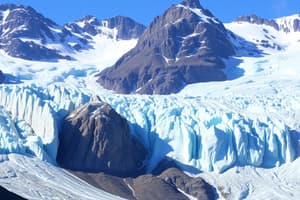Podcast
Questions and Answers
What are tills?
What are tills?
- Liquid sediments
- Unsorted compressed sediments (correct)
- Compressed sediments
- Sorted sediments
What is stratified till?
What is stratified till?
Well sorted sediments, often in layers
Which of the following is NOT a type of continental glacier landform?
Which of the following is NOT a type of continental glacier landform?
- Dunes (correct)
- Terminal Moraines
- Ground Moraines
- Drumlins
What characterizes ground moraines?
What characterizes ground moraines?
What do terminal moraines indicate?
What do terminal moraines indicate?
What are drumlins?
What are drumlins?
What are outwash points?
What are outwash points?
How is a kame formed?
How is a kame formed?
What are eskers?
What are eskers?
What does glaciation refer to?
What does glaciation refer to?
What is deglaciation?
What is deglaciation?
What is an interglacial period?
What is an interglacial period?
How many glaciations occurred in the last 2.6 million years?
How many glaciations occurred in the last 2.6 million years?
What was the last major glaciation?
What was the last major glaciation?
What defines permafrost?
What defines permafrost?
What is continuous permafrost?
What is continuous permafrost?
What is discontinuous permafrost?
What is discontinuous permafrost?
What characterizes dry permafrost?
What characterizes dry permafrost?
What does wet permafrost contain?
What does wet permafrost contain?
What is the active layer above permafrost?
What is the active layer above permafrost?
What are ice wedges?
What are ice wedges?
What are pingos?
What are pingos?
What is a talik?
What is a talik?
What is loess?
What is loess?
Flashcards are hidden until you start studying
Study Notes
Tills and Stratified Till
- Tills are unsorted, compressed sediments left behind by glaciers.
- Stratified till consists of well-sorted sediments, often deposited in distinct layers.
Continental Glacier Landforms
- Ground moraines are even, blanket-like deposits, typically tens of meters thick.
- Terminal moraines mark the positions of glacier ice fronts.
- Recessional moraines occur where glaciers halt temporarily during retreat.
- Drumlins are streamlined hills formed from till beneath moving ice, indicating past ice flow direction.
- Outwash plains are large fluvial deposits created by meltwater transporting sediments down glacier valleys.
- Kames result from sediments deposited on ice surfaces that lower when the ice melts.
- Eskers are long, winding ridges formed from river deposits within or under glacial ice.
Glacial Processes
- Glaciation refers to the advancement of ice sheets across land.
- Deglaciation indicates the retreat of ice sheets.
- Interglacial periods are times between glaciation events.
Causes of Ice Ages
- Ice ages are influenced by climate variations, notably the Milankovitch Cycle, which includes changes in Earth’s axial tilt and orbit.
- Ice ages recur approximately every 100,000 years due to these cycles.
Recent Glaciation History
- Over the last 2.6 million years, there have been 12 distinct glaciations.
- The last major glaciation, known as the Wisconsinan glaciation, occurred around 25,000 years ago in North America and Canada, with global sea levels approximately 125 meters below current levels due to isostatic rebound.
Permafrost Characteristics
- Permafrost consists of ground material that remains permanently below 0 degrees Celsius.
- Continuous permafrost indicates a widespread, unbroken layer beneath the surface.
- Discontinuous permafrost is found only in favorable areas and varies in thickness.
- Dry permafrost is characterized by cold, cemented soil, while wet permafrost contains significant water content.
- The active layer above permafrost thaws and freezes seasonally, affecting the underlying permafrost.
Ice Features
- Ice wedges form as cold conditions cause shrinkage in ice, leading to polygonal cracking, which fills with meltwater and refreezes.
- Pingos are dome-shaped mounds that can reach 60-70 meters in height, formed by water pressure freezing and expanding beneath permafrost layers.
- Talik represents a zone of unfrozen ground located beneath a lake within permafrost.
Loess Deposits
- Loess refers to thick blankets of windblown dust that settle in certain regions, promoting agricultural productivity and good infiltration. Sources include desert regions and areas affected by deglaciation.
Studying That Suits You
Use AI to generate personalized quizzes and flashcards to suit your learning preferences.




